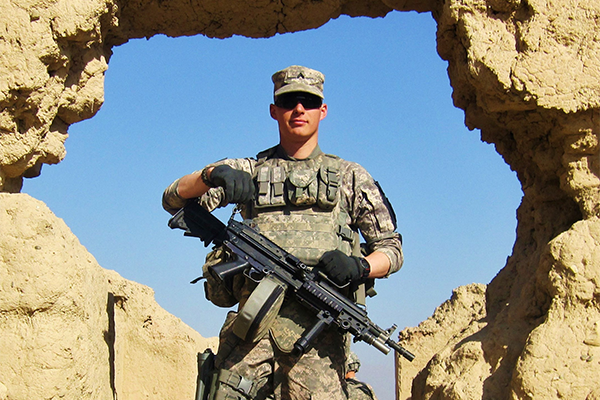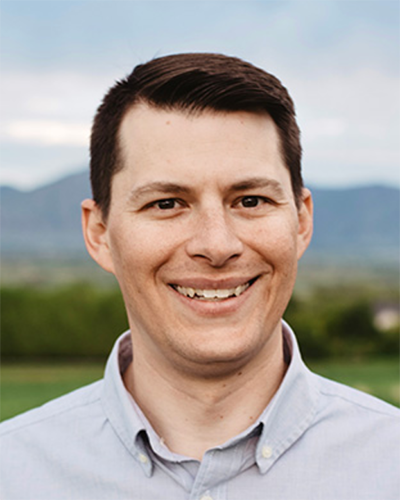A Soldier's Resolve: Jacob Hunsaker’s Dedication to Nursing and Mental Health

Jacob Hunsaker in Afghanistan
Planes filled the air, carrying young soldiers from the United States into the heart of Afghanistan's treacherous terrain. With each step onto foreign soil, soldiers, like Utah State University alum Jacob Hunsaker ’13 BA, ’15 MMFT, ’21 BSN, a member of the U.S. Army Reserve, braced for the battles ahead, knowing they would test their resolve and change them forever.
It was late 2010, and the United States had intensified its military efforts in Afghanistan, deploying an additional 30,000 troops to combat the Taliban insurgency. Jacob, serving as a combat engineer, took his job of searching for IEDs and roadside bombs very seriously. His dedication earned him promotions to team leader and later squad leader. Understanding the wellbeing of his team was paramount, he realized that being in good physical shape was crucial, but maintaining mental health was equally important.
“I began doing talk therapy techniques with my team members,” Jacob recalled of his service during late 2010 and throughout 2011. “I realized what a difference it made under the heavy circumstances we were placed in, and, when I returned to Logan, I knew I had to continue my USU studies to become a licensed marriage and family therapist.”
After earning a bachelor's degree in Spanish from the College of Humanities and Social Sciences in 2013, Jacob immediately enrolled in the master's program for marriage and family therapy at the Emma Eccles Jones College of Education and Human Services, graduating in 2015. He began his career at a community health center, which sparked his interest in the medical side of therapy.
“I recognized in graduate school that I was not only interested in therapy, but also in the medical aspects of the field,” Jacob said. “I wanted to help families navigate therapy in stressful medical situations through an integrated healthcare approach, where patients, providers, and therapists work together. So, I enrolled in USU’s Registered Nurse, baccalaureate of science in nursing program.”
USU’s Department of Nursing, housed in the Emma Eccles Jones College of Education and Human Services, was established in 2017 and has quickly garnered an excellent reputation. Impressively, the 2021-22 and 2022-23 graduating cohorts both achieved a 100 percent first-time pass rate on the NCLEX exam, a crucial step in becoming a registered nurse. Most USU nursing students secure job offers even before graduation. However, the program is rigorous, particularly in the final semester when students must complete a 144-hour preceptored capstone experience, where they shadow and work alongside a registered nurse for twelve 12-hour shifts. Students in USU’s nursing program complete their preceptorships at institutions such as Logan Regional Hospital, Primary Children’s Hospital, Huntsman Cancer Institute, and McKay Dee Hospital.
“Our students typically complete their preceptorships during the latter half of their final semester, mirroring whenever possible the exact schedule of their assigned registered nurse,” said Dr. Carma Miller, department head and professional practice associate professor for the Department of Nursing. “If the nurse has two 12-hour shifts at Primary Children’s Hospital, our students are expected to be there — on top of their regular class load. The students do not get paid for their preceptorship, and, as you can imagine, they are practically running on fumes. It's a valuable reality check that demonstrates the dedication required for the profession.”
Jacob recalls his last semester and the immense strain it put on him and his family. Married with three children at the time, a fourth would come later, Jacob juggled completing his labs and clinicals during the day while working full-time as a therapist. The day he learned he had received a scholarship, he walked out of the building and called his wife, and together they shared a joyful, tearful moment.
“The final year of nursing school is, by far, the busiest,” Jacob said. “You are financially the most vulnerable you will ever be as a student, and receiving a scholarship was a huge deal for me and my family. We were barely scraping by, and the money helped lessen some of the financial strain so we could purchase groceries and gas. It meant so much to us.”
Since he was slightly older than his fellow nursing cohorts, Jacob, who graduated with his bachelor’s of nursing in 2021, was seen as a type of father figure and mentor to those who studied alongside him.
“Jacob’s decision to pursue a second bachelor’s degree in nursing is a testament to his dedication to his clients,” Dr. Miller said. “By doing so, he aims to provide both psychological and medical care, eliminating the need for his clients to see multiple professionals for their treatment. This choice is remarkable, given the financial hardship and time away from his family that pursuing a second-degree can entail. Everyone in his graduating class looked up to him.”
Nursing education can be financially challenging for many students, particularly those from low-income and first-generation college student backgrounds. At Utah State, nursing education is not only provided at the main campus in Logan but is a vital part of the statewide campus system as well. The nursing program is one of the most popular majors in Blanding and Moab, and, in Blanding, the nursing cohort is largely made up of Navajo students. This diversity enriches the program and ensures that USU is training nurses who can provide culturally competent care across different communities right here in Utah.
“Financial support can make nursing education more accessible to a wider range of students,” Dr. Miller explains. “It can also help attract high-potential students who might otherwise be discouraged by the cost of education. Overall, financial support, combined with our excellent facilities and dedicated faculty, will increase the number of qualified nurses entering the workforce.”
USU’s nursing program offers individuals an emotionally fulfilling and rewarding career with the flexibility to choose a specialty they are passionate about in a setting of their choice. With degrees ranging from a practical nursing certificate and an associate of applied science in nursing to a bachelor of science in nursing and an online-only registered nurse to bachelor of science in nursing, there is truly something for everyone.
Dr. Miller notes that “When you ask someone why they want to become a nurse, the majority will say it’s because they want to help people.”
Jacob Hunsaker Hardship Nursing Fund
Helping people is exactly what Chloe Richmond, the 2023-24 Emma Eccles Jones College of Education and Human Services student senator, aimed to do when she started as a pre-nursing student at USU. Although she later switched her major to kinesiology, Chloe witnessed the challenges her peers faced in the nursing program.
“I saw many peers drop out of nursing because of the long hours, extensive clinical shifts, and lack of compensation,” Chloe said. “I wanted to address this during my time as senator, so I discussed creating a hardship fund for nursing students with Dean Al Smith and Dr. Miller.”
For Chloe, it became clear that supporting nursing students is crucial to their success. She recognized that nurses do more than provide medical care; they work on the front lines, administering treatments, offering comfort, and advocating for their patients. With a diverse skill set, nurses act as caregivers, innovators, and critical thinkers. In every hospital, clinic, and healthcare facility, they ensure that patients receive comprehensive and compassionate care. This dedication to local service is especially vital in today’s healthcare landscape.
“When Chloe proposed the idea of creating a hardship fund to help nursing students, we immediately thought of Jacob because his story perfectly embodies the spirit of compassion and service essential to the nursing profession,” Dr. Miller said.
The Jacob Hunsaker Hardship Nursing Fund is now part of the AggieFunded program, thanks to Chloe’s dedication and efforts. AggieFunded is a platform that enables student organizations and affinity groups to raise funds for innovative projects, programs, and initiatives, allowing them to make a significant impact on campus and beyond. The ultimate goal is growing the fund into an endowment, which requires reaching a minimum of $25,000.
“Donating to USU’s Jacob Hunsaker Hardship Nursing Fund is truly an investment in the future and we have a lot of money to raise to reach the endowment level,” noted Dr. Miller. “Donations help attract and retain students, expand program capacity, and advance nursing science. The best part is that supporting nursing education ensures more highly skilled and compassionate nurses will be available to provide care for us or our loved ones in the future as so many of our graduates stay to serve right here in Utah.”
Jacob, honored and humbled by the nursing students’ decision to name the fund after him, remains proud of his Aggie heritage. He has remained in Logan, running a successful practice, River Hollow Mental Health, because he wanted to give back to the community that gave him so much.
“Our practice mentors nursing and therapy students, and we hire USU graduates,” Jacob said. “We pride ourselves on giving back by hosting free seminars at the university, other schools, hospitals, and churches, and we provide a free mental health support group every Wednesday for adults. We try to give back as much as we can.”
Today, Jacob is pursuing a doctorate degree of nursing practice in psychiatric and mental health to further his goal of providing a full range of services for those dealing with stressful situations throughout their lifespan, thus embodying the true spirit of caring.

